TV advertising is expensive and designed to increase consumer awareness to various services and products. Many of these products can HARM the consumer even if federal guidelines are followed providing some level of awareness explaining these dangers.
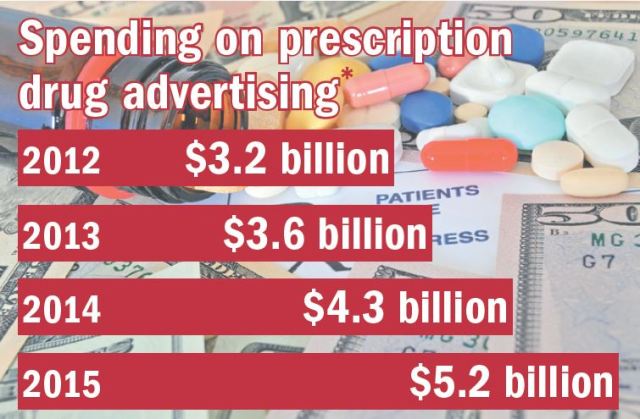
“The latest statistics for 2016 showed drugmakers on track to spend an estimated 6.4 BILLION dollars on direct to consumer pharmaceutical advertising.”
(Reference: https://www.usatoday.com/story/money/2017/03/16/prescription-drug-costs-up-tv-ads/99203878/)
Why are pharmaceutical companies investing so much money into TV advertising?
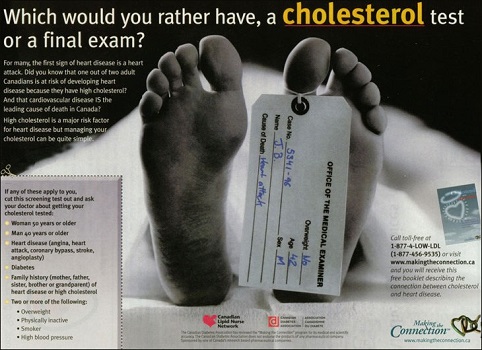
FEAR INCREASES CONSUMER SPENDING WHILE CREATING ENORMOUS PHARMACEUTICAL AND MEDICAL PROFITS
These advertised medications, however, have NOT achieved overcoming the diseases and conditions they are taken for!
These commercials and advertisements increase pressure on physicians as well to write scripts that otherwise would never have been written for their patients. A recent physician survey proved this point:
“Surprisingly, 62% of physicians, for instance, said they would or might prescribe an innocuous, even placebo treatment to a patient who didn’t need it but demanded it, according to a 2016 poll conducted by Medscape, an online physician education website.”
Why are patients demanding pharmaceuticals from their doctors? Do they believe their doctors are insufficiently trained in pharmaceuticals or is it possible their current drug regimen isn’t sufficiently creating the desired or expected results?
Instead of searching for the latest pharmaceutical “magic bullet”, what about asking yourself this question:
HOW CAN A NATION’S HEALTH SYSTEM BE EFFECTIVE AT RESTORING PATIENT HEALTH IF THE AVERAGE PERSON IS REQUIRED TO TAKE INCREASING QUANTITIES OF NEW PHARMACEUTICAL PRODUCTS DESIGNED TO SUSTAIN THEIR DISEASE OR CONDITION RATHER THAN OVERCOME IT?
Have these drugs reduced the number of Cardiac Disease patients? Have these drugs reduced the number of Diabetics? Have these drugs reduced the rate of Obesity? Have these drugs reduced the rate of Cancer?
NO!
Have these drugs allowed people to potentially live longer lives with reduced FUNCTION and QUALITY while increasing the cost and time frame for requiring renewable prescriptions?
YES!
If pharmaceutical TV advertising was truly intended to benefit the consumer’s well being, why would this form of advertising be BANNED everywhere EXCEPT the United States and Australia?
At what point do we begin to realize that physicians roles (in general) are to overcome acute conditions (infections, broken bones and other traumas while identifying other health imbalances (ex. chemistry imbalances like high blood sugar) that can be referred to professional lifestyle/functional physicians capable of providing patient guidance to RESOLVE (NOT MAINTAIN) these issues.
Doctors are important professionals. Every profession, however, has its limitations. Those physicians who truly want what’s in their patient’s best interest must be willing to honestly express these limitations to help their patients recognize THEIR INDIVIDUAL ROLES and RESPONSIBILITIES in achieving and maintaining good health.
This REALITY creates mutual awareness for both physician and patient to initiate a new paradigm needed for our health care system to reverse the trend of growing rates of diseases and conditions. It views a patient’s deviation from HEALTH (in most cases) as a TEMPORARY condition (rather than a CHRONIC LIFELONG DISEASE) utilizing MULTIPLE approaches to restoring quality health based on addressing individual patient needs.
The increasing pharmaceutical investment in TV advertising (exposing the public to newly approved patented drugs) has effectively increased pharmaceutical PROFITS. These new drugs, however, are not developed to REPAIR/FIX the underlying CAUSES of these conditions and diseases. These new drugs are part of the medical business model to increase RESIDUAL PASSIVE INCOME as prescriptions are refilled over and over again.
Pharmaceutical drugs absolutely play a role in patient treatment plans today. We simply need to better understand how and when to use them, rather than relying on them (as we do) our entire lives. If commercials incentivize us to tell our doctors which drugs they should prescribe to us, maybe it’s time we approach these same doctors with the REALITY that these drugs aren’t FIXING our conditions!
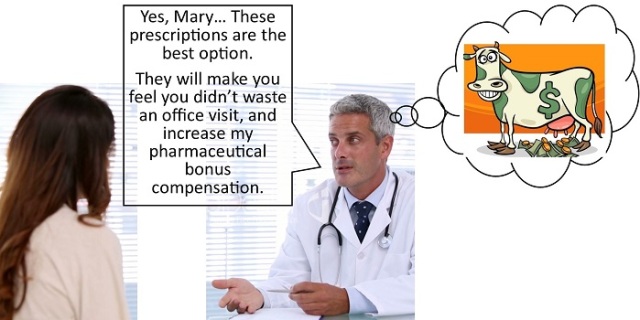

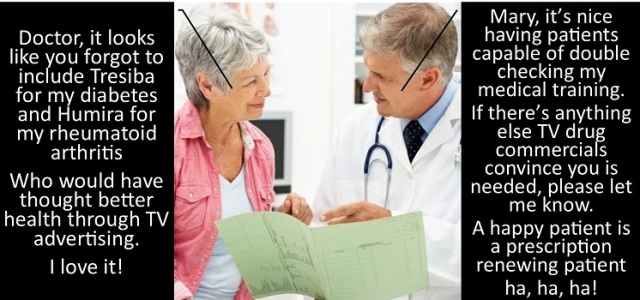
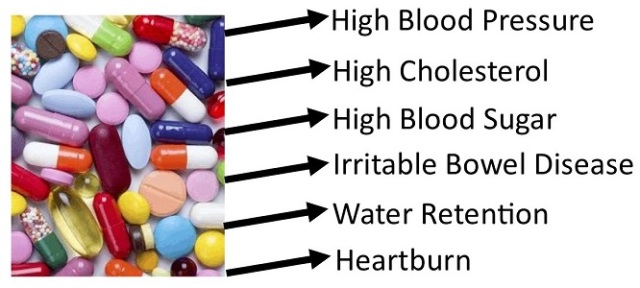


I agree with you Jonathan on the concerns of drug advertising. It definitely serves a need in that it’s important for consumers to know about new treatments, but the way it’s framed around scaring people like you said is just not helpful.
LikeLiked by 1 person
Health and healthcare is BIG BUSINESS. Unfortunately, this amount of revenue commonly leads to deceptive practices crossing ethical and moral boundaries. This is true for most BIG INDUSTRIES. I simply have a difficult time accepting the fact that sacrificing human life is tolerated and seen as collateral damage in the process of generating “ungodly” wealth. I’m not sure what actions occurred over time that convinced us to believe it wasn’t possible to generate significant profits from services and/or products that benefitted BOTH consumer and business owner/corporation without causing harm to either!
LikeLiked by 1 person
I have no real comment to make on this post only that we don’t have drugs advertising here. As for the rest, I was just curious Doc since am reading a book titled Fasting and Eating for Health: A Medical Doctor’s Program For Conquering Disease by Dr. Joel Fuhrman (Author), what could be your take on the idea of fasting and eating right being better options to wellness than pills?
LikeLiked by 1 person
Dr. Joel Fuhrman is a highly respected physician with an enormous amount of clinical experience. With that said, I believe periodic fasting to allow the body to remove existing “waste” is a healthy approach to living life. I am NOT a fan of daily fasting or multiple days of fasting because this approach places additional stresses on the body regardless of whether a person begins this process as a healthy individual or not. If an undiagnosed pre-existing weakness exists and an individual places excessive demands (via fasting) on the body, it may trigger an unwanted and potentially dangerous response.
I would rather a person create balance among eating, exercise, stress reduction, channelling of harmful stress, hydration, sleep, and social interaction with 24 hour food fasting anywhere from 1-4 times a year (while consuming adequate quantities of water during this food fasting process.) Intentionally placing stress on the body also stimulates stress hormones as a protective mechanism that may cause unwanted side effects.
Following a PLAN ON ACTION capable of being maintained throughout a lifespan makes the most sense to me. This is why I am a fan of the “middle of the road” when it comes to action plans. Extreme changes often lead to temporary outcomes. I follow the TORTOISE philosophy in life… I slowly and methodically move forward to achieve my goals. Time frame (in most cases) becomes irrelevant. Appreciating the journey AND the outcome is my mission in life. This philosophy has served me well.
LikeLiked by 1 person
I so agree with your post and I love the intention of your entire blog. I used to take a daily cocktail of prescription meds and each time I had some complaint about a side effect, I was given another drug to take. Fortunately, I came to my senses and had an opportunity to attend an 8 week in-patient program run by a doctor who holds beliefs like yours. I am now drug free.
The drug companies do hold much responsibility for America being overmedicated, but I think medical doctors, especially psychiatrists, use medicine as their only tool to manage symptoms that can and should be managed in other ways.
I don’t know exactly how things will change, but I hope to see more outspoken professionals like yourself get this into the mainstream so people start to ask themselves if taking a fistful of meds everyday is really the best life they can have. Thank you!
LikeLiked by 3 people
Your personal testament to these truths is incredibly valuable. You add credibility by showing yourself as an example to this situation. Hopefully, others read your comment and consider finding alternative pathways to achieving healthier outcomes. Keep up the good work!
LikeLiked by 1 person
So much good information in here. I had no idea pharm advertising is banned in other countries. That makes a lot of sense. It will be a long time before that happens here. At the very least can’t we begin to put warnings in these commercials as we do with cigarettes?
And that stat of 62% of the doctors might prescribe a placebo. That is frightening.
LikeLiked by 1 person
They provided “side effect” warnings on each commercial. The problem is consumers do not believe these side effects will truly cause THEM harm. In their minds, if these were “real” side effects, the drugs would never have been approved.
LikeLiked by 1 person
I often turn and look at my wife when I hear the long list of side affects. Just not worth it.
Have a great weekend.
LikeLiked by 1 person
I recommending to the drug companies to have a contest. Whoever experiences the greatest number of side effects should win a free year’s supply of that drug. They haven’t replied to my suggestion yet. 😀
LikeLiked by 1 person
LOL
LikeLiked by 1 person
I’m surprised at the number of ads where I don’t even have any idea what the drug is supposed to do or what disease it is supposed to offer some relief for.
LikeLiked by 2 people
Even if people see ads like the ones you describe, they are likely to eventually believe it is probably important to discuss with their doctor. Convincing the consumer is what advertising is all about!
LikeLiked by 1 person
Wonderful post!! It is scary that with all the side effects that they have to disclose on those ads, that people would rather take them than eat healthier and exercise… That is discouraging! Thank you Doctor Jonathan!
LikeLiked by 1 person
People tend to want simplicity. They want easy acts that support compliance. Taking medication is simple and fast regardless of whether the process achieves LONG TERM benefits. People live in the HERE and NOW. If lab values look “good” they are satisfied with the pharmaceutical advice. People would rather “patch” a problem than use the effort necessary to “FIX” it. This is an unfortunate component of human nature TODAY. It wasn’t always this way. We have allowed technology to grossly impact the quality of our lives as we have become increasing complacent in attitude when it comes to supplying our bodies and our minds with essential needs.
LikeLike
Great post. It is interesting how pharmaceutical companies utilize push marketing. They create a demand that might have not existed otherwise.
LikeLiked by 1 person
This has been the medical business healthcare model for many years. Until consumers recognize its limitations, they will gladly continue to reinforce this message. Unfortunately, it will negatively impact the quality of people’s lives while claiming success at increasing longevity. Reality can be a difficult thing to face and accept. In my opinion, better options exist that can transform one’s life dramatically for the better.
LikeLike
[…] ARE PHARMACEUTICAL ADS MORE BENEFICIAL OR HARMFUL TO THE AVERAGE CONSUMER […]
LikeLiked by 1 person
I’m only 30 and fortunately I don’t need any prescription medication right now. However, the amount of pharmaceutical advertising on TV and the internet (for places like YouTube) is ridiculous and doesn’t make me want to chat with my doctor about “seeing if _____insert pill name here____ is right for me.” If anything, it makes me want to avoid those medications. I always listen to the lower, more muted voice who explains the side effects… YIKES! No thank you!
LikeLiked by 1 person
For those who accept responsibility for their health and lives, they are more likely to resist these commercials. For those choosing PASSIVITY, they believe this is their ONLY option. How sad!
LikeLike
My husband and I was just talking about this topic the other day, an ad came on TV and the list of side effects they went through was so much worse than the disease I was totally sold on the fact of holistic health!! They really need to scale back, reminds me of the time when cigarettes were sold on TV…crazy…..xx
LikeLiked by 2 people
People do not want to associate doctors with the tobacco industry. They want the “white coats” to demonstrate purity and goodness. Although I believe most physicians are well intentioned, I also believe most physicians are unwilling to raise their eyes from an indoctrinated education to question the efficacy and RESULTS of their treatment protocols.
When I was a student, I constantly challenged my profession and their achievements. Anecdotal evidence (by itself) is not enough to justify ongoing treatment protocols. I was taught that spinal manipulation could affect all types of health maladies. Although I do believe (from research), the adjustment can influence function (organ and skeletal) it is NOT enough (by itself) to correct all diseases and degenerative processes. Other components in life must be included to restore health and balance to the body. This same approach applies to medicine as well.
LikeLiked by 1 person